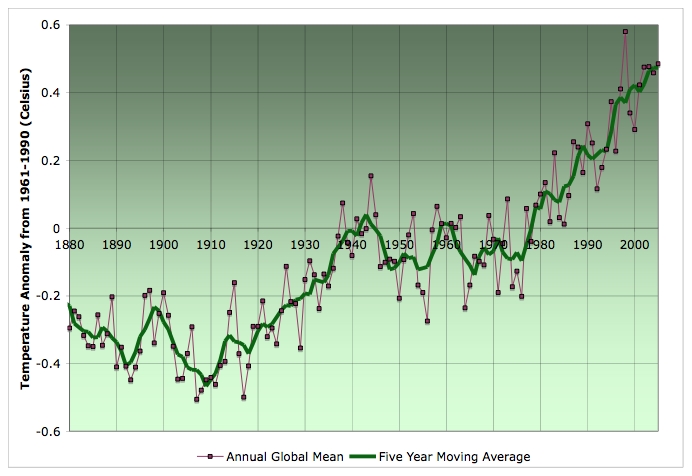
Monkey-brained Musings
Monday, February 06, 2006
Cloudy With a Chance of Chaos

Like the tourists on Phuket beaches who stood and gazed at an oncoming tsunami because it was outside their experience, society is reacting to the coming wave of climate change without urgency. People still believe that the science is controversial and the threat of climate change far off in the future; and while a few businesses, notably major insurers, have begun to adapt, governments are responding only slowly, as the lack of progress at this fall's international forum in Montreal showed.
Originially published in Fortune, this article notes how the insurance industry is beginning to respond to the growing threats posed by climate change.
More than 1,000 miles from New Orleans, in Cape Cod, Mass., a far-flung echo of Katrina has been the 20% rise in reinsurance costs (reinsurers are financial institutions that backstop insurance companies). The increase prompted Hingham Mutual Group, a property and casualty insurer, to drop coverage for 6,500 commercial properties. Customers left in the lurch have a fallback in FAIR (short for Fair Access to Insurance Requirements), a program mandated by various states and run by insurers. But Massachusetts's FAIR plan recently requested big rate increases, arguing that past weather patterns may no longer be a guide to estimating future climate risks. That rationale was "unprecedented," a team of industry experts noted in a report entitled "Availability and Affordability of Insurance Under Climate Change"; it's a vivid example of how insurance has difficulty adapting to changing climate.
As businesses begin to recognize the dangers of climate change, markets will help economies adjust, pricing the risks and shifting resources. Yet markets have blind spots: They typically underprice long-term or novel risks. In the case of climate change, where large-scale actions must be taken lest change hit with full force, a purely market-based response would be too little, too late. To address the risks, governments need to get involved.
The truly distrubing conculsion, though, that is suggested by recent studies is that we may have already passed the point where we could have addressed climate change without major economic and social hardships. Meanwhile, the Bush Administration continues to ignore this ongoing debate over whether we are approaching a tipping point when the effects of climate change will exceed our ability to respond. Even as other nations become increasingly concerned, the Bush Administration continues to argue that uncertainty about climate change means that it may continue to be ignored.
Graph courtesy of The Oil Drum

Like the tourists on Phuket beaches who stood and gazed at an oncoming tsunami because it was outside their experience, society is reacting to the coming wave of climate change without urgency. People still believe that the science is controversial and the threat of climate change far off in the future; and while a few businesses, notably major insurers, have begun to adapt, governments are responding only slowly, as the lack of progress at this fall's international forum in Montreal showed.
Originially published in Fortune, this article notes how the insurance industry is beginning to respond to the growing threats posed by climate change.
More than 1,000 miles from New Orleans, in Cape Cod, Mass., a far-flung echo of Katrina has been the 20% rise in reinsurance costs (reinsurers are financial institutions that backstop insurance companies). The increase prompted Hingham Mutual Group, a property and casualty insurer, to drop coverage for 6,500 commercial properties. Customers left in the lurch have a fallback in FAIR (short for Fair Access to Insurance Requirements), a program mandated by various states and run by insurers. But Massachusetts's FAIR plan recently requested big rate increases, arguing that past weather patterns may no longer be a guide to estimating future climate risks. That rationale was "unprecedented," a team of industry experts noted in a report entitled "Availability and Affordability of Insurance Under Climate Change"; it's a vivid example of how insurance has difficulty adapting to changing climate.
As businesses begin to recognize the dangers of climate change, markets will help economies adjust, pricing the risks and shifting resources. Yet markets have blind spots: They typically underprice long-term or novel risks. In the case of climate change, where large-scale actions must be taken lest change hit with full force, a purely market-based response would be too little, too late. To address the risks, governments need to get involved.
The truly distrubing conculsion, though, that is suggested by recent studies is that we may have already passed the point where we could have addressed climate change without major economic and social hardships. Meanwhile, the Bush Administration continues to ignore this ongoing debate over whether we are approaching a tipping point when the effects of climate change will exceed our ability to respond. Even as other nations become increasingly concerned, the Bush Administration continues to argue that uncertainty about climate change means that it may continue to be ignored.
Graph courtesy of The Oil Drum
Comments:
Post a Comment

